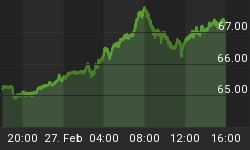Stockton, California (population: 292,000) an 83-mile drive northeast of San Francisco, and, more poignantly, 69 miles east of Vallejo, California (See: ![]() "The Coming Collapse of the Municipal Bond Market"), cannot pay its bills. Nor, is much else getting done. On-the-scene reporter Alison Vekshin (Bloomberg) filed a front-line view on February 23, 2012: "After a man with a laptop walked into Best PC Value computer repair in Stockton, California, owner Richard La Frentz telephoned the police. Hours before, the same man had been recorded by a security camera hopping a locked gate behind the store and stealing the computer. 'The police didn't come.' They told La Frentz to call his insurance company, he said. 'It is the Wild West out here,' said La Frentz, 47 [but feeling considerably older - FJS], who keeps two handguns at his store in Stockton's Miracle Mile shopping district. 'When I call the police department, I don't get help. The city can't help me because of the condition it's in.'"
"The Coming Collapse of the Municipal Bond Market"), cannot pay its bills. Nor, is much else getting done. On-the-scene reporter Alison Vekshin (Bloomberg) filed a front-line view on February 23, 2012: "After a man with a laptop walked into Best PC Value computer repair in Stockton, California, owner Richard La Frentz telephoned the police. Hours before, the same man had been recorded by a security camera hopping a locked gate behind the store and stealing the computer. 'The police didn't come.' They told La Frentz to call his insurance company, he said. 'It is the Wild West out here,' said La Frentz, 47 [but feeling considerably older - FJS], who keeps two handguns at his store in Stockton's Miracle Mile shopping district. 'When I call the police department, I don't get help. The city can't help me because of the condition it's in.'"
The title of Vekshin's story was "California's Stockton Seeks to Avoid Vallejo Path to Court." For entities not awarded illusory funding by the ECB, U.S. Treasury Department, or the State of California, reality pounces like a thief in the night, sometimes literally. The very next day, Bloomberg's ace Stockton bureau chief (our very own Alison Vekshin) furnished the latest. Under the headline: "Stockton, California, May Ask Bondholders to 'Suffer,' City Officials Say," we learned the Stockton City Council "will meet February 28 to consider a type of mediation that allows creditors to participate, the first move toward a Chapter 9 bankruptcy filing under a new state law."
The privilege bestowed on bondholders, allowing them, perhaps, to prevent further assaults on Richard La Frentz, will not be shared by all. Like the "voluntary" participation of Greek bondholders in that country's default, investors will be shedding exposure to other municipalities in similar straits.
Forbes magazine chose Stockton, California as "America's Most Miserable City" in 2011. The selection committee explained: "Median home prices in the city tripled between 1998 and 2005, when they peaked at $431,000. Now we are back to where they started, as the median price is forecast to be $142,000" in 2011. A graph on Forecastchart.com shows prices had been rising at a decent clip since 1995.
In May 1995, Federal Reserve Governor Larry Lindsey warned the FOMC: "There has been a lot of easing of credit terms. At some point this is going to stop." Lindsey told the FOMC cadavers that bankers stopping by his office were lending on exceptionally easy terms. He went on to say that when bank "balance sheet go into reverse.... [i]t is going to exacerbate the downturn." It did not turn out well for municipal balance sheets, either.
Fed Chairman Alan Greenspan thought the debt issue mentioned by Larry Lindsey was an "interesting one." He was more interested though, in gunning the housing market. At the next FOMC meeting (July 1995) Greenspan grew excited about the home builders' data, which was revving up. The future recipient of the Enron Prize for Distinguished Service noted, "if history is any guide...firmness in the home building area [would] exert...some upward movement in the motor vehicle area, which would be very useful." Useful to the most melodramatic civil servant since Rudolph Hess.
City manager Bob Deis took exception to Stockton's worst-in-show: "Stockton has issues it needs to address, but an article like this is equivalent to bayoneting the wounded. I find it unfair..." Employees at Best PC Value would tell Deis that no police protection from violent crime is unfair.
Where we find 67% house-price deflation, misery follows. Sixteen of Forbes' Most Miserable Cities are in California or Florida. Before the deflation, the same cities enjoyed - Oh, how they enjoyed! - house-price inflation. City revenues would rise as far as the eye could see, which was not too far. Vekshin reported: "Stockton is already worse off than Vallejo. It had the eighth-highest violent crime rate in the country in 2010; the second-highest foreclosure rate in the U.S., behind Las Vegas; and the eighth-highest unemployment, at 15.9 percent in December, almost double the national average."
During the boom, tax receipts took off like a rocket, as did spending and promises. Vekshin found: "A drop in property-tax and program-fee collections shrank the city's revenue 20% to a projected $161.8 million in fiscal 2012 from $203.1 million in 2009. At the same time, union contracts drove employee pay and benefits higher." The Titanic had a better chance of remaining afloat.
Stockton City Manager Deis fills in the blanks: "Next year, we expect to pay more for retiree health insurance than [salaries and benefits] for our current employees. Deis called the promises "a Ponzi scheme." That's just what municipal bondholders across America should be investigating.
Frederick Sheehan writes a blog at www.aucontrarian.com
















